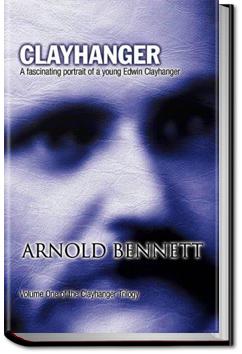UNLIMITED Audiobooks and eBooks
Over 40,000 books & works on all major devices
Get ALL YOU CAN for FREE for 30 days!
Clayhanger
Arnold Bennett
Book Overview:
This first of a series of four novels (Clayhanger, Hilda Lessways, These Twain and The Roll-Call) is a coming-of-age story set in the Midlands of Victorian England, following Edwin Clayhanger as he leaves school, takes over the family business, and falls in love.
The books are set in Bennett's usual setting of "the 5 Towns", a thinly-disguised version of the six towns of "the Potteries" which amalgamated (at the time of which Bennett was writing) into the borough (and later city) of Stoke-on-Trent.
In one of the earlier chapters in the book, Bennett writes that Edwin had only heard of a philosopher as 'someone who made the best of a bad job' and in some ways that is what Edwin has to do in the book - survive under a stifling layer of conduct imposed by his father, his church and the society he is part of.
This first of a series of four novels (Clayhanger, Hilda Lessways, These Twain and The Roll-Call) is a coming-of-age story set in the Midlands of Victorian England, following Edwin Clayhanger as he leaves school, takes over the family business, and falls in love.
The books are set in Bennett's usual setting of "the 5 Towns", a thinly-disguised version of the six towns of "the Potteries" which amalgamated (at the time of which Bennett was writing) into the borough (and later city) of Stoke-on-Trent.
In one of the earlier chapters in the book, Bennett writes that Edwin had only heard of a philosopher as 'someone who made the best of a bad job' and in some ways that is what Edwin has to do in the book - survive under a stifling layer of conduct imposed by his father, his church and the society he is part of.
How does All You Can Books work?
All You Can Books gives you UNLIMITED access to over 40,000 Audiobooks, eBooks, and Foreign Language courses. Download as many audiobooks, ebooks, language audio courses, and language e-workbooks as you want during the FREE trial and it's all yours to keep even if you cancel during the FREE trial. The service works on any major device including computers, smartphones, music players, e-readers, and tablets. You can try the service for FREE for 30 days then it's just $19.99 per month after that. So for the price everyone else charges for just 1 book, we offer you UNLIMITED audio books, e-books and language courses to download and enjoy as you please. No restrictions.
What had changed him was the slow daily influence of a large number of trifling habitual duties none of which fully strained his faculties, and the monotony of them, and the constant watchful conventionality of his deportment with customers. He was still a youth, very youthful, but you had to keep an eye open for his youthfulness if you wished to find it beneath the little man that he had been transformed into. He now took his watch out of his pocket with an absent gesture and look exactly like his father’s; and his tones would be a reflection of those of the last important full-sized man w. . . Read More
Try now for FREE!

"Love your service - thanks so much for what you do!"
- Customer Cathryn Mazer
"I did not realize that you would have so many audio books I would enjoy"
- Customer Sharon Morrison
"For all my fellow Audio Book & E-Book regulars:
This is about as close to nirvana as I have found!"
- Twitter post from @bobbyekat



Community Reviews
Bennett’s other epic pales in comparison with The Old Wives’ Tale, following the frequently uneventful life and times of a printer’s apprentice, beleaguered by a tyrannical father, a nonexistent sex life, and a thwarted career in architecture. Typical unflinching realism from an underread master chr
This is a coming-of-age story although it takes our young man, Edwin, up to about age 30, after his father’s death, to break out of his childhood,. We’re told he’s finished with school at age 16 in 1872 so that gives you a timeframe for the story --Victorian England. It’s a long novel with a lot of
There are so many books to read that rarely can I justify reading a book more than once.
I have read Clayhanger three times due to Bennett creation of one of literary's most sympathetic and empathetic characters in Edwin Clayhanger. The rest of the series don't quite measure up but I so wanted Edwin
A great read and first in the trilogy. Edwin is a frustrating character in many ways. He does not follow his dream of being an architect and instead follows his father Darius into the family printing business. The book follows his pathway from adolescence to adulthood and the promises we all make to
Years ago I read Margaret Drabble's masterful biography of Arnold Bennett and proceeded to read most of his novels with pleasure. This one, *Clayhanger,* was written in 1910 and was the first of a series of books about a family living in the pottery-making district of England in the 19th C. It conce
If you are adverse to books that "move slowly," then by all means pass on this one. What Bennett is so very good at is creating characters by examining the minutia of their lives, desires, and personalities. I found "Clayhanger" to be so absolutely human in a way that's eminently recognizable even n